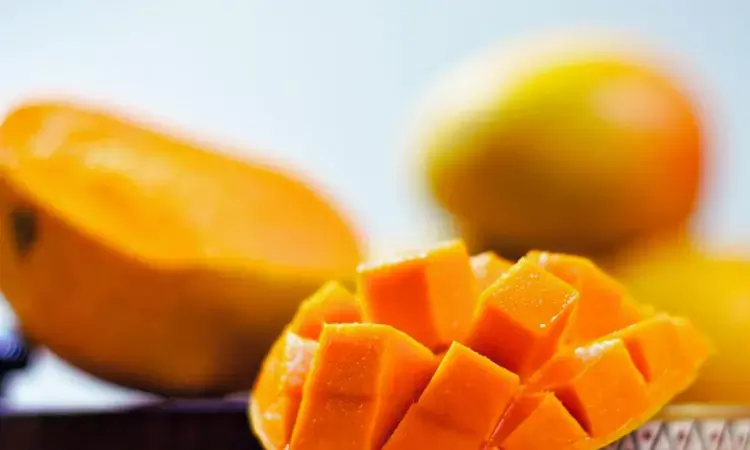- Home
- Medical news & Guidelines
- Anesthesiology
- Cardiology and CTVS
- Critical Care
- Dentistry
- Dermatology
- Diabetes and Endocrinology
- ENT
- Gastroenterology
- Medicine
- Nephrology
- Neurology
- Obstretics-Gynaecology
- Oncology
- Ophthalmology
- Orthopaedics
- Pediatrics-Neonatology
- Psychiatry
- Pulmonology
- Radiology
- Surgery
- Urology
- Laboratory Medicine
- Diet
- Nursing
- Paramedical
- Physiotherapy
- Health news
- Fact Check
- Bone Health Fact Check
- Brain Health Fact Check
- Cancer Related Fact Check
- Child Care Fact Check
- Dental and oral health fact check
- Diabetes and metabolic health fact check
- Diet and Nutrition Fact Check
- Eye and ENT Care Fact Check
- Fitness fact check
- Gut health fact check
- Heart health fact check
- Kidney health fact check
- Medical education fact check
- Men's health fact check
- Respiratory fact check
- Skin and hair care fact check
- Vaccine and Immunization fact check
- Women's health fact check
- AYUSH
- State News
- Andaman and Nicobar Islands
- Andhra Pradesh
- Arunachal Pradesh
- Assam
- Bihar
- Chandigarh
- Chattisgarh
- Dadra and Nagar Haveli
- Daman and Diu
- Delhi
- Goa
- Gujarat
- Haryana
- Himachal Pradesh
- Jammu & Kashmir
- Jharkhand
- Karnataka
- Kerala
- Ladakh
- Lakshadweep
- Madhya Pradesh
- Maharashtra
- Manipur
- Meghalaya
- Mizoram
- Nagaland
- Odisha
- Puducherry
- Punjab
- Rajasthan
- Sikkim
- Tamil Nadu
- Telangana
- Tripura
- Uttar Pradesh
- Uttrakhand
- West Bengal
- Medical Education
- Industry
Mango Consumption Tied to Improved Insulin Sensitivity in Obese People with Chronic Inflammation: Study

USA: A recent study published in the journal Nutrients has highlighted the potential benefits of mango consumption in improving insulin sensitivity among individuals with overweight or obesity and chronic low-grade inflammation. The researchers found that regular mango consumption could improve insulin sensitivity, as participants who consumed mangoes twice daily for four weeks exhibited lower insulin levels and decreased systemic insulin resistance compared to the control group.
Chronic low-grade inflammation is a known contributor to insulin resistance and poor glycemic control, key factors in developing type 2 diabetes mellitus (T2DM). In this context, Katherine D Pett, Center for Nutrition Research, Department of Food Science and Nutrition, Institute for Food Safety and Health, Illinois Institute of Technology, Chicago, USA, and colleagues aimed to explore the impact of regular mango consumption on inflammation and insulin sensitivity in individuals experiencing overweight or obesity, coupled with chronic low-grade inflammation.
For this purpose, the researchers conducted a human clinical study using a randomized, controlled, two-arm, parallel design. Participants underwent a 2-hour oral glucose tolerance test (OGTT) before and after 4 weeks of either mango or control product intake (1 cup, twice a day). Blood samples were collected during fasting and at various time points for 2 hours post-OGTT to assess the effects on plasma metabolic and inflammation endpoints.
Data analysis was performed using analysis of covariance and repeated-measure approaches (SAS 9.4) to evaluate the impact of mango consumption.
The study led to the following findings:
- Forty-eight adults (37.6 ± 2.8 years, BMI 30.5 ± 4.1 kg/m²) completed the study.
- Markers of inflammation (IL-6, TNFα, hs-CRP) showed no significant difference at the end of 4 weeks.
- The mango intervention did not significantly impact fasting glucose levels.
- Insulin levels were significantly lower in the mango group compared to the control group (8.2 ± 1.2 vs. 15.3 ± 1.2 µIU/mL).
- The Homeostasis Model Assessment of Insulin Resistance (HOMA-IR) and disposition index (DI) were significantly improved in the mango group compared to the control group (HOMA-IR: 2.28 ± 1.19 vs. 4.67 ± 1.21, p = 0.03; DI: 2.76 ± 1.02 vs. 5.37 ± 1.03).
- Mean insulin concentrations were significantly lower at week 4 compared to week 0 in the mango group after the OGTT.
- Relative expression of the Nrf-2 gene, which regulates antioxidant defense, was non-significantly increased twofold in the mango group (week 4 vs. week 0).
According to the authors, the study provides compelling evidence that regular mango intake can improve insulin sensitivity in individuals with chronic low-grade inflammation. This is reflected in significant reductions in fasting insulin concentrations and HOMA-IR, and improvements in the disposition index (DI) after 4 weeks of daily mango consumption. They note that the findings do not support a direct role of inflammation reduction in these improvements. While gene expression data associated with Nrf-2 suggest a potential link to enhanced endogenous antioxidant defense—known to promote insulin sensitivity—the study does not conclusively confirm this mechanism. The authors conclude that mango intake may enhance insulin sensitivity by activating the Nrf-2 gene and boosting cellular antioxidant status.
"These findings emphasize the potential benefits of incorporating mango into a dietary regimen aimed at addressing insulin resistance and call for further research to elucidate the underlying mechanisms of mango’s effects," they wrote.
Reference:
Pett, K. D., Alex, P. G., Weisfuss, C., Sandhu, A., & Edirisinghe, I. (2024). Mango Consumption Is Associated with Increased Insulin Sensitivity in Participants with Overweight/Obesity and Chronic Low-Grade Inflammation. Nutrients, 17(3), 490. https://doi.org/10.3390/nu17030490
Dr Kamal Kant Kohli-MBBS, DTCD- a chest specialist with more than 30 years of practice and a flair for writing clinical articles, Dr Kamal Kant Kohli joined Medical Dialogues as a Chief Editor of Medical News. Besides writing articles, as an editor, he proofreads and verifies all the medical content published on Medical Dialogues including those coming from journals, studies,medical conferences,guidelines etc. Email: drkohli@medicaldialogues.in. Contact no. 011-43720751


